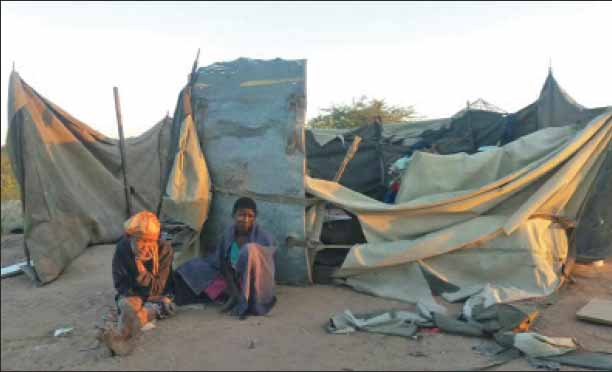“Govt doesn’t care about Basarwa” – Khwedom Council
As rain clouds gather above the Boteti skies, the clouds dance seductively but the scorching heat hits hard to dismiss any hope of rain pelts. The veldt is warm with backdrops of the cold. There is little sign of life as it is midweek. Ocassionally, a bird flies in the sky and a forlorn figure can be seen ducking in the forest. The life of the Basarwa in the Boteti is not only lonely but frightening too.
They live far away from resources. “As things stand, these people have to travel long distances to access basic services such as schools and health posts.
Some children get tired and frustrated from the up and down and end up dropping out of school,” said Botswana Khwedom Council public relations officer Banyatsi Salutu. In this forsaken area, having ambitions is a luxury. There isn’t much to do beyond being idle and if one has the energy, fornicating. Boteti is a mineral rich area and one would expect that the standard of living would be better. Instead, the opposite is the reality. Poverty and hopelessness are rife in the area.
“We have had more than four cases of women who gave birth in the open veldt or even kombis as they tried to make their way to hospitals to give birth. A special fare on a taxi is P25 and most of them cannot afford that money because there is no employment; they end up giving birth here, with no proper care,” said Salutu. When residents see outsiders, they flock to them like birds to carrion, hoping to salvage something. Most of the residents, particularly Basarwa, live in abject poverty. The area is undeveloped and improverished and puts a blot on Botswana’s development record. Although diamonds are mined in the area, the people here have nothing to show for it.
Their humour masks frustration and pain. They not only lack basic amenities but also pride and self identity; their dignity is gone, like that of a village harlot whose only sense of pride is once being desired, if only for five minutes. Speaking to The Midweek Sun recently, Botswana Khwedom Council public relations officer Banyatsi Salutu claimed that Basarwa were better off when De Beers operated in the area. “They got us jobs and cared,” he said.
Things changed when Debswana took over. “Basarwa were struck off the work roll and we were pushed out and treated like rubbish. It has been a roller coaster ride since then.” However, Debswana’s Matshidiso Kamona refutes this claim, insisting they follow the National Employment Act.
While she could not divulge much before engaging the personnel in Orapa/Letlhakane, she was aware that the Khwedom Council had presented some grievances. She asked for a questionnaire which she had not responded to by press time.
Salutu said that they wanted government to engage them on issues affecting the Basarwa and other indigenous tribes in Botswana. The Botswana Khwedom Council was registered by Registrar of Societies in 2008 and purpots to represent minority tribes and stands against the abuse and oppression of the Bakhwe (Basarwa). Salutu said it was horrible how issues affecting Basarwa continue to be treated with indifference, claiming that some politicians only showed interest in their plight for political mileage and were not really concerned with their condition.






